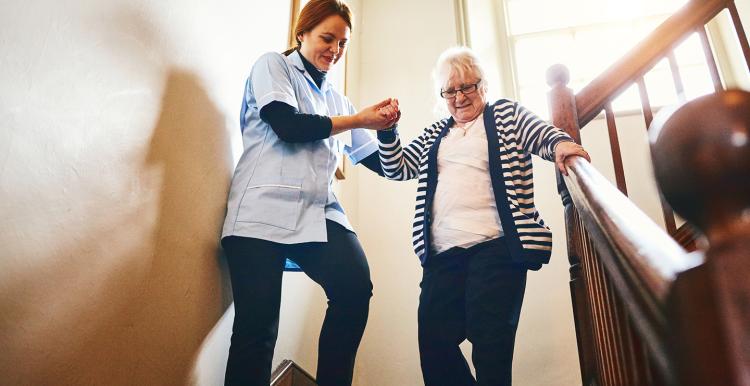Home care service users tell us about their experiences

I feel supported to build on what I can do for myself most of the time.
This year we’ve been gathering the views of residents who use home care services, mindful of the fact that it’s not always easy for these service users to be heard by decision-makers. So far, we’ve interviewed 26 people. We explored what’s working well, as well as the challenges faced by service users and their families. Here we share some of our findings:
It's important that service users feel in control
Interviewees who were positive about the quality of the home care service gave feedback showing they felt secure and in control. This confidence was enabled by the way the services were run.
- These residents reported feeling listened to and feeling supported.
- They said they knew what to expect from the home care service, ‘I get given the list of carers who come and when they will be coming.’
- Communication was effective, and relationships with individual carers tended to be strong.
- The degree to which residents felt empowered in their relationships with their carers and the care agency played a big part in determining their opinion of the service as a whole.
What made some service users feel less in control?
Some of the people we spoke to did not feel empowered. There were several reasons for this:
- These residents did not feel listened to and said that complaining made no difference.
- There were weaker relationships with individual carers, ‘The carers hardly wanted to talk to me, and they were always pushed for time.'
- Difficulties communicating in English, whether on the part of the service user or the carer team, could also make residents feel powerless.
- Not being able to predict carers’ arrival times could be very frustrating.
Quality of care
Most people had some good things to say about the quality of care, and a number of the people we interviewed were full of praise. Sometimes praise was given to the service as a whole, and sometimes it was reserved for the principal carer or carers.
“Thumbs up all round. They provide an excellent service. Yes, I feel listened to, they provide good support and I get on well with my carers and know their names. They will go above and beyond the service if necessary. They do usually turn up on time, but if they are going to be late, it’s always a ‘London’ issue ie public transport. The office always informs me of this. Do I feel supported to build on what I can do for myself? Absolutely. Anything that needs to be improved? No, nothing.”
Concerns included poor communication, cultural barriers affecting the quality of care, carers avoiding certain tasks or not doing everything in the care plan, lack of flexibility about the care provided, lack of continuity/always getting different carers, not enough care, lack of initiative on the part of caring staff, and carers lacking basic skills. Service users were understanding of occasional lateness, but frequent lateness was viewed as an indicator of poor-quality service.
Personal relationships with carers
Feedback on relationships with carers was mostly positive. These relationships were clearly very important. Some people spoke about having great affection for their carers or regarding them like members of their family. Where carers were more like strangers this generally equated to a poorer experience of care. One resident, responding on behalf of her mother, expressed frustration at simple opportunities missed by their home care provider to make the service more personal.
“With different carers coming and going, it is difficult for mum to remember their names. It would be much better if they introduced themselves - some don’t even do that. And better still if they wore a name badge. Why can’t they do this - it would be so simple? Some of their names are difficult to pronounce so a name badge would be very helpful with that, too. Some carers just leave without saying goodbye, leaving mum to go from room to room to look for them, only to find they have left.”
Our next steps
- We are meeting with home care agencies this Autumn to learn more about the challenges of delivering home care services and what can help providers to meet those challenges.
- We will publish a report on our work so far before the end of the year, and continue to gather feedback from residents receiving home care in the year to come.
Tell us what you think about home care services
We’d like to hear your feedback on home care services. What works well and what needs to be improved?
Phone 07538 764436 or email gulum@healthwatchislington.co.uk to participate.


